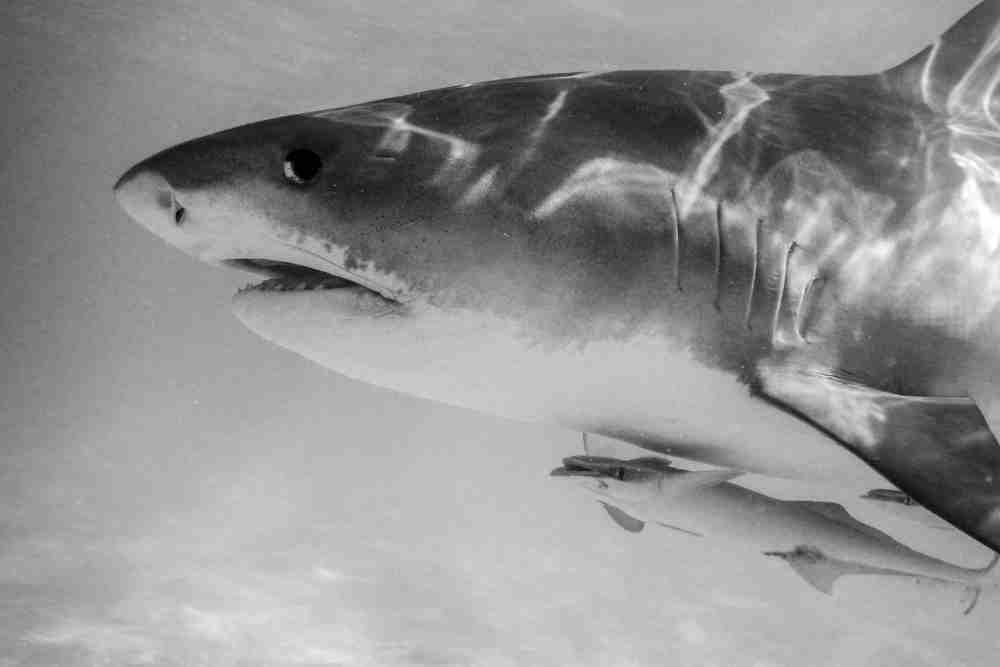No, sharks do not swallow water when they swallow their food. When sharks eat, they use a suction motion to draw food into their mouths, filtering out any water in the process.
Sharks have specialized adaptations in their gills that allow them to extract oxygen from the water as it passes over their gill filaments, while expelling excess water through their gill slits. This efficient method ensures that sharks consume only the food they need and do not ingest unnecessary amounts of water.
These apex predators have evolved to be highly efficient hunters, with their unique anatomical features perfectly suited for their underwater lifestyle.

The Mechanics Behind Shark Feeding
Sharks have a unique way of feeding that doesn’t involve swallowing water along with their food. The mechanics behind shark feeding are fascinating. When it comes to their eating habits, sharks use their powerful jaws to capture and hold onto their prey.
With a wide variety of tooth shapes, they are able to effectively tear apart their food. Sharks have a highly flexible throat that allows them to swallow their meals whole. The anatomy of a shark’s mouth is designed to prevent the intake of water, ensuring that only the desired food enters their digestive system.
It’s interesting to note the process of capturing and ingesting prey, as sharks are highly skilled hunters. They use their speed and agility to ambush or chase down their targeted meals. Once caught, the shark will tear into their prey, all while avoiding the intake of water.
The mechanics behind shark feeding showcase the incredible adaptations of these apex predators in the underwater world.
Do Sharks Actually Swallow Water?
Sharks do not actually swallow water when they swallow their food, debunking the myth.
The Efficiency Of Shark Feeding
Sharks have unique adaptations that enable them to consume their prey efficiently. Their sharp teeth and powerful jaws play a crucial role in the feeding process. With teeth designed for cutting and gripping, sharks can tear through flesh effortlessly. Some species, like the Great White Shark, have serrated teeth that are perfect for slicing through prey.
Others, like the Whale Shark, have sieve-like teeth that filter out small organisms from the surrounding water. Each shark species has its own feeding method, depending on its physical characteristics and habitat. For example, the Hammerhead Shark uses its wide head to pin down and maneuver prey, while the Tiger Shark is known for its ability to consume almost anything, including turtles, dolphins, and even garbage.
Sharks have perfected their feeding techniques over millions of years, making them efficient predators in the underwater world.
FAQs
What Happens When Sharks Swallow Water?
Sharks swallow water to help them breathe and pump it over their gills for oxygen.
How Does A Shark Swallow Food?
A shark swallows food by opening its jaws wide and using its powerful throat muscles to force the food down.
Why Do Sharks Not Swallow Water?
Sharks do not swallow water because they have a specialized system that allows them to separate water from prey.
Does Water Go In Sharks Mouth?
Yes, water goes into the mouth of sharks as they swim and breathe through their gills.
Conclusion
The fascinating question of whether sharks swallow water when they consume their food has been explored in this blog post. Through careful analysis, it has been determined that while sharks do not typically swallow water while eating, they do employ a unique mechanism to facilitate the ingestion of their prey.
By opening their mouths wide, sharks create a powerful suction force that allows them to draw in their food. They then use their specialized teeth to grasp and tear apart the prey, consuming it piece by piece. This efficient feeding strategy ensures that sharks are able to consume their prey quickly and effectively.
With their powerful jaws and unique feeding habits, sharks continue to be a subject of awe and wonder in the world of marine biology. As we delve deeper into understanding these magnificent creatures, we gain a greater appreciation for the intricate workings of the natural world.